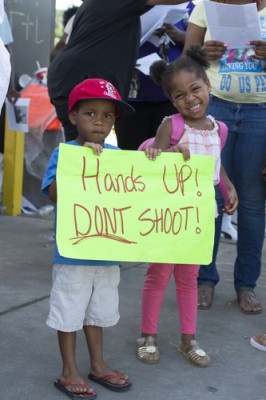Some questions to consider:
1. Why do poor people have such high obesity rates?
2. Why are only 18.5 percent of Congress members female (PDF)?
3. Why are black people more likely to be in jail than whites?
Children protest in Ferguson, Missouri. (Photo: R. Gino Santa Maria/ Shutterstock)

All three refer to indisputable facts about America. But the reasons behind them are nuanced, and the way a person answers these questions is a direct indicator of whether or not he or she understands structural inequality.
For those who don’t acknowledge how the structure and institutions of our society have ill effects on oppressed populations, the answers may appear to be straightforward: Poor people have no self control. Women aren’t fit for office. Blacks are lawless. Those who understand the many societal barriers faced by minorities and women know that the answers are rarely so simple. As Lisa Wade wrote in February:
Republicans are much more likely to endorse an individualist explanation (e.g., people are poor because they are lazy), whereas Democrats are more likely to offer a structural explanation (e.g., it matters where in the class structure you begin and how we design the economic system).
But I’d like to move beyond the political distinction, because in my experience, a lot of people who opt for the individualist explanation are simply not informed or misled by their insidious simplicity. I’ll admit that growing up in my sheltered, upper-middle-class suburb, I did not gain full understanding of structural inequality until college. My parents, immigrants with no college education, never talked to me about it; in school, we rarely even discussed racism, period. But once I did start learning about structural racism and sexism, I started to see it everywhere. I only wish someone had thought to point at it and give it a name earlier.
I’m not here to speculate on when it’s “too late” for a person to genuinely understand or appreciate the power of structural racism and sexism, but I firmly believe that it’s never too early. For those who work with students, have kids, or simply have some ignorant Facebook friends to school, I present this helpful Storify, curated by education tweeps, on how to talk about the recent events in Ferguson. Go forth and spread awareness, not vitriol. —Bettina Chang



